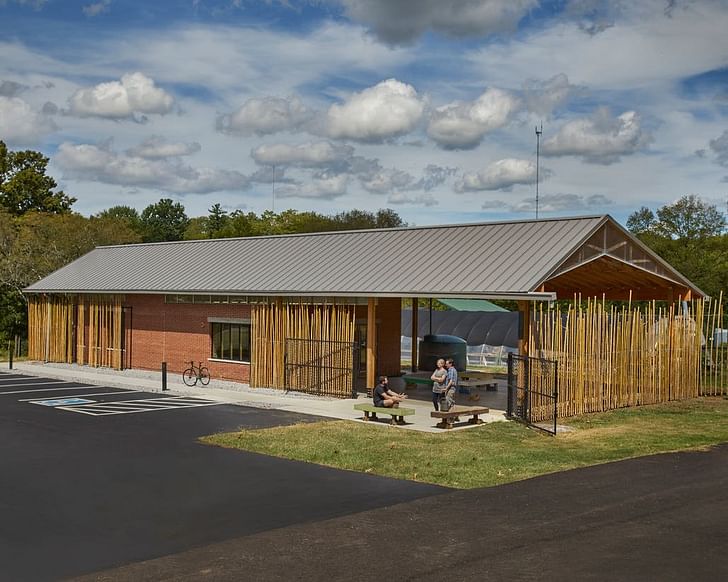

Over the past few years, the field has received a growing amount of attention that has highlighted longstanding labor issues within the architecture industry, ranging from unsustainable pay models to unwelcoming work environments. That’s why it is “more urgent than ever,” says Peggy Deamer (who started the Architecture Lobby to tackle such issues), that “we have a system that highlights labor matters, that fights for fairness and not management.”
Looking for an alternative, the group created the Just Design Initiative, which recognizes fair labor practices in architecture. Beginning with nominations submitted by employees, and followed by an evaluation process, the team looked at practices that can serve as models of a new status quo within the profession. Archinect has teamed up with the Just Design crew to profile firms across the country that meet the initiative's standards. Whether it is a family-friendly work schedule or a health coverage plan that goes above and beyond, the series spotlights practices that honor the basic rights of their employees and can serve as exemplary models of what should become standard for the field.
“I don't want my employees working 60 hours a week,” says Elizabeth Eason, founder of the Knoxville-based firm under the same name. Started in 2003, Eason’s practice specializes in sustainable design, focusing on “solutions that are beneficial for the nature around us, the waters where we play, the air we breathe, and the communities where we live,” she says. But, these values don’t just apply to their built work, they’re also folded back into how the office operates.
Working sustainably is a big part of the culture at Elizabeth Eason Architects and is promoted through a flexible scheduling policy and a compensation model designed to minimize long working hours. At Elizabeth Eason Architects, all employees, including interns, are paid on an hourly basis and provided with overtime for hours worked over 40 per week, which goes beyond the standard practice of the profession at large and helps ensure fair pay.
“We do not have any overtime exempt employees,” say the firm’s leadership. “That's one thing that's unique about our firm, that we pay everyone hourly. If they work overtime one week, they get paid overtime that week. We don't do comp time.”
Wages at the firm are tied to changing economic circumstances. Entry level pay is based off the living wage in the Knoxville area for roughly two adults and one child, with the expectation of the employee supporting a spouse and child. This calibration does not factor in overtime, ensuring hourly pay can be put into practice in good faith.
The firm’s pay structure was designed to encourage a healthy work-life balance, and is coupled with flexible scheduling policies so employees can work around family and other personal commitments. Employees can opt for a compressed workweek to allow for 3-day weekends or can take breaks during the day as needed. Their policy for paid time off does not distinguish between sick, personal, and vacation time to allow employees to use at their own discretion. While the company has yet to have a worker need maternity or paternity leave, they are currently revamping their policy with the help of Living Future Institute’s Just Program, which helps organizations optimize policies to improve social equity and enhance employee engagement.
The office has ensured fair treatment of employees by implementing clear and standardized protocols for advancement and promotion. Advancement, along with increases in base hourly wage and benefits, is tied to completion of certain professional benchmarks. For example, at each point in the IDP process, once an intern passes 25% of their required hours, they automatically advance from Designer I to Designer II and so forth until they get their license. There's a pay increase for each step in the IDP process, and then again upon licensure, after which incremental increases become based on years of experience rather than short-term performance.
By implementing long-term policies that are documented and accessible, the firm’s advancement structure promotes fair treatment of all employees and limits potential for abuses. It also demonstrates that equitable employment terms and broad benefits—such as extensive health coverage, incentives for alternative transportation and a socially responsible retirement fund matched by the employer—are not inherent to any firm size or structure.
The firm offers its workers a continuing education credit that can be used for IDP, study materials, or continuing education if licensed; they also cover their employee’s AIA membership costs. Additionally, the firm encourages staff to take on adjunct teaching positions, volunteer with nonprofits like their local preservation organization, and take on pro bono opportunities.
“We really want our employees to work a 40-hour workweek and go home to their family or get out in the community or be active as members” says Eason. “And so we try to make that the culture here” she adds.
No Comments
Block this user
Are you sure you want to block this user and hide all related comments throughout the site?
Archinect
This is your first comment on Archinect. Your comment will be visible once approved.